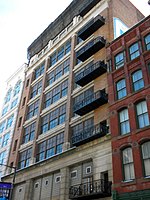Sigma Sound Studios
1968 establishments in Pennsylvania2014 disestablishments in PennsylvaniaBuildings and structures in PhiladelphiaCulture of PhiladelphiaRecording studios in the United States
Sigma Sound Studios was a recording studio in Philadelphia, Pennsylvania, U.S.. It was founded in 1968 by recording engineer Joseph Tarsia.Located at 212 North 12th Street in Philadelphia, it was one of the first studios in the United States to offer 24-track recording capacity and the first anywhere to successfully employ console automation. Tarsia, formerly chief engineer at Philadelphia's Cameo-Parkway Studios, also opened Sigma Sound Studios of New York City in 1977, at the Ed Sullivan Theater building.
Excerpt from the Wikipedia article Sigma Sound Studios (License: CC BY-SA 3.0, Authors).Sigma Sound Studios
Race Street, Philadelphia Center City
Geographical coordinates (GPS) Address Nearby Places Show on map
Geographical coordinates (GPS)
| Latitude | Longitude |
|---|---|
| N 39.95605 ° | E -75.15905 ° |
Address
Four Points by Sheraton Philadelphia City Center
Race Street 1201
19107 Philadelphia, Center City
Pennsylvania, United States
Open on Google Maps








